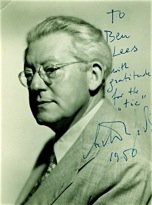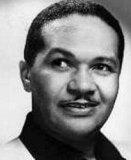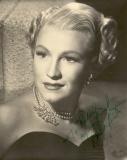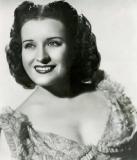
Info about Artur Rodzinski 
Robert Todd Duncan (February 12, 1903 – February 28, 1998) was an American baritone opera singer and actor. Todd Duncan was born in Danville, Kentucky in 1903. He obtained his musical training at Butler University in Indianapolis with a B.A. in music followed by an M.A. from Columbia University Teachers College. In 1933, Duncan debuted in Pietro Mascagni's Cavalleria rusticana at the Mecca Temple in New York with the Aeolian Opera, a black opera company. Duncan was George Gershwin's personal choice as the first performer of the role of Porgy in Porgy and Bess in 1935 and played the role more than 1,800 times. He led the cast during the Washington run of Porgy and Bess at the National Theatre in 1936, to protest the theatre's policy of segregation. Duncan stated that he "would never play in a theater which barred him from purchasing tickets to certain seats because of his race." Eventually management would give into the demands and allow for the first integrated performance at National Theatre. Duncan was also the first performer for the role of Stephen Kumalo in Kurt Weill's Lost in the Stars. Duncan taught voice at Howard University in Washington, D.C. for more than fifty years. While teaching at Howard, he continued touring as a soloist with pianists William Duncan Allen and George Malloy. He had a very successful career as a concert singer with over 2,000 performances in 56 countries. He retired from Howard and opened his own voice studio teaching privately and giving periodic recitals. In 1945, he became the first African American to sing with a major opera company, and the first black person to sing in an opera with an otherwise white cast, when he performed the role of Tonio in Leoncavallo's Pagliacci with the New York City Opera. In the same year he sang the role of Escamillo, the bullfighter, in Bizet's Carmen. In 1955, Duncan was the first to record Unchained Melody, a popular song with music by Alex North and lyrics by Hy Zaret. The recording was made for the soundtrack of the obscure prison film Unchained. Following Duncan's version, the song went on to become one of the most recorded songs of the 20th century. In his final interview, Todd Duncan spoke of his love for spirituals: "... spirituals are so deep inside of me, it's difficult for me to find words that are meaningful. Spirituals are a part of whatever I am. When I sing them my being sings them, not my throat.... It is very difficult for me to put into words something that is at the bottom of my very being."

Dorothy Kirsten (July 6, 1910, Montclair, New Jersey — November 18, 1992, Los Angeles, California) was an American operatic soprano. Kirsten's mother was an organist and music teacher, her grandfather was a conductor, and her great-aunt, Catherine Hayes, was also an opera singer. She left high school at age 16 and worked for the Singer Corporation sewing machine company and for New Jersey Bell, studying voice in her spare time. Her teacher, Louis Darnay, eventually employed her as a secretary and maid. By the late 1930s she had an ongoing professional career as a radio singer on WINS, a member of the Kate Smith Chorus, and as a vocalist for pop orchestras. She mentored under Grace Moore from 1938, who had her study in Rome with Astolfo Pescia. Her time in Europe was cut short by the outbreak of World War II, and she returned in 1939, debuting at the New York World's Fair.[2] Roles followed at the Chicago Grand Opera Company (Manon, 1940), San Carlo Opera Company (1942), New York City Opera (1943), San Francisco Opera (1945), and New York Philharmonic (1945). Her radio program "Keepsakes" ran for a year in 1943-44. Kirsten joined the roster of principle sopranos at the Philadelphia La Scala Opera Company (PLSOC) in 1943 and spent much of her time performing there through 1947. She made her debut with the company in an out of town performance at the Syria Mosque in Pittsburg on May 18, 1943 as Mimì in Giacomo Puccini's La Boheme with Nino Martini as Rodolfo, Carlo Morelli as Marcello, and Armand Balendonck conducting.[citation needed] In the 1943-1944 PLSOC season at the Academy of Music she portrayed Mimì many times and sang Nedda in Pagliacci with Giovanni Martinelli as Canio. She also toured with the company to Detroit in October 1943, singing Mimì to Armand Tokatyan's Rodolfo. Kirsten opened the PLSOC's 1944-1945 season singing Micaëla in Georges Bizet's Carmen with Bruna Castagna in the tile role. She also toured with company to Cleveland singing Mimì. In February 1946 she traveled with PLSOC to Washington D.C. to perform Marguerite in Charles Gounod's Faust. In December 1949 she recorded Manon Lescaut with the world renowned tenor Jussi Björling. Her final year performing with the PLSOC was the 1946-1947 season, portraying Cio-cio-san in Madama Butterfly and Juliette in Roméo et Juliette. Kirsten debuted at the Metropolitan Opera with the role of Mimi in La Boheme on December 1, 1945, and continued to sing with the Met for the next thirty years. While she performed primarily in the United States, she did perform in Europe at times, and gave performances in the USSR in 1962, singing Violetta in La Traviata at the Bolshoi Opera. She sang in the American premieres of William Walton's Troilus and Cressida and Francis Poulenc's Dialogues of the Carmelites in San Francisco. In addition to her operatic activities, she sang on radio with Frank Sinatra, Bing Crosby, Nelson Eddy, and Perry Como. She also appeared in two films, Mr. Music (1950) and The Great Caruso (1951). Her last performance with the Met was on February 10,1979 as Tosca. She published an autobiography, A Time to Sing in 1982. She was married three times. Her first marriage was to Edward MacKayes Oates, with a divorce in 1949; the second to Eugene Chapman in 1951, who died three years later; and the third to neurosurgeon Douglas French, who died in 1989. She suffered a stroke on November 5, 1992, and died of complications on November 18, 1992. Her papers are currently housed at the Howard Gotlieb Archival Research Center at Boston University. 
Nan Merriman (April 28, 1920- ) is an American operatic mezzo-soprano, born in Pittsburgh, Pennsylvania. She is most famous for singing many roles both live and on radio under the baton of the legendary Arturo Toscanini between 1944 and 1952, while he was conductor of the NBC Symphony Orchestra. Among the roles she sang with him, all released on CD, are Maddalena in Act IV of Giuseppe Verdi's Rigoletto, Emilia in Verdi's Otello, Mistress Page in Verdi's Falstaff, and the trouser role of Orfeo in Act II of Gluck's Orfeo ed Euridice. She was also featured as Dorabella in a famous 1956 La Scala performance of Mozart's Così fan tutte, which was conducted by Toscanini's short-lived protegee, Guido Cantelli. This has also been released on compact discs, as have her studio recordings of Spanish and French songs with Gerald Moore at the piano. Nan Merriman retired from performing to raise a family in 1965.
Биографии и фотографии тенора Дональда Дэйма, выступающего в записи Девятой симфонии, я не нашел. Ludwig van Beethoven Symphony no 5 in C minor, Op. 67 New York Philharmonic Orchestra 14.10.1945 Royal Philharmonic Orchestra 1956 Symphony no 7 in A major, Op. 92 New York Philharmonic Orchestra 06.01.1946 Symphony no 9 in D minor, Op. 125 "Choral" Donald Dame, tenor
Todd Duncan, baritone
Dorothy Kirsten, soprano
Nan Merriman, mezzo-soprano
New York Philharmonic Orchestra and Chorus
14.04.1946 (live) Artur Rodzinski |

